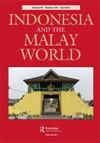从青年到青年
IF 0.9
3区 社会学
0 ASIAN STUDIES
引用次数: 2
摘要
摘要本研究调查了当代印尼如何看待和表达千禧一代的公民民族主义。我们将公民民族主义定义为民族主义,其中公民身份的基础是确保不同宗教或种族的人平等的公民关系。自后新秩序时期以来,Laskar Jihad、Front Pembela Islam(伊斯兰防御阵线,FPI)和Hizbut Tahrir Indonesia(HTI)等直言不讳的伊斯兰团体所倡导的宗教民族主义一直在与印尼公民民族主义进行斗争。尽管面临这一挑战,我们认为,印尼的公民民族主义已经得到了蓬勃的再现,当前的千禧一代发挥了积极的作用,尽管研究经常将他们描绘成不关心政治的remaja(消费主义青年)。我们用NusantaRun和SabangMerauke作为青年社区积极宣传公民民族主义叙事的例子。我们还认为,他们关于公民民族主义的思想强调信仰间参与以消费文化、自我发展和志愿服务为中心的活动,所有这些都符合后新秩序印度尼西亚更广泛的新自由主义环境。这些发现源于我们对他们社交媒体话语的采访和分析,将有助于推进对印尼几代人不断变化的民族主义表达的研究。本文章由计算机程序翻译,如有差异,请以英文原文为准。
From Pemuda to Remaja
ABSTRACT This study investigates how the civic nationalism of the current millennial generation is perceived and expressed in contemporary Indonesia. We define civic nationalism as nationalism in which the foundations of citizenship are civic ties that ensure equality for people of different religions or ethnicities. Since the post-New Order period, religious nationalism promoted by vocal Islamist groups such as Laskar Jihad, Front Pembela Islam (Islamic Defence Front, FPI), and Hizbut Tahrir Indonesia (HTI) has contested Indonesian civic nationalism. Despite this challenge, we argue that Indonesian civic nationalism has been vibrantly reproduced, with the current millennial generation playing an active role, despite studies that frequently portray them as apolitical remaja (consumerist youth). We use NusantaRun and SabangMerauke as examples of youth communities that actively promote civic nationalist narratives. We also contend that their ideas on civic nationalism emphasise interfaith engagement in activities centred on consumer culture, self-development, and volunteerism, all of which fit into the broader neoliberal milieu of post-New Order Indonesia. These findings, deriving from our interviews and analyses of their social media discourse, will help to advance research on changing nationalist expressions across Indonesian generations.
求助全文
通过发布文献求助,成功后即可免费获取论文全文。
去求助
来源期刊

Indonesia and the Malay World
ASIAN STUDIES-
CiteScore
2.00
自引率
0.00%
发文量
17
期刊介绍:
Indonesia and the Malay World is a peer-reviewed journal that is committed to the publication of scholarship in the arts and humanities on maritime Southeast Asia. It particularly focuses on the study of the languages, literatures, art, archaeology, history, religion, anthropology, performing arts, cinema and tourism of the region. In addition to welcoming individual articles, it also publishes special issues focusing on a particular theme or region. The journal is published three times a year, in March, July, and November.
 求助内容:
求助内容: 应助结果提醒方式:
应助结果提醒方式:


